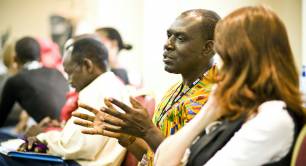‘Dearth of laws and policies’ holds back social enterprise around the world – new report
A global study led by Lex Mundi Pro Bono Foundation and launched at the World Economic Forum’s virtual Davos Agenda finds current legal requirements can even be a “hindrance” to the development of social enterprise in some jurisdictions.
Social enterprise is being held back by a “dearth of laws and policies” around the world, a landmark global report has found.
The Lex Mundi Pro Bono Foundation – the non-profit affiliate of international law firm network Lex Mundi – published a new study setting out how legal reform can support the development of social enterprise around the world last week.
The paper, Legal reform as a catalyst for social enterprise: an international social enterprise law & policy report, reviews law and policy in 83 jurisdictions around the world and interviewed hundreds of local lawyers across continents.
The report says: “Although social enterprises can be found in all corners of the world, most jurisdictions suffer from a dearth of laws and policies that support them, and in some cases, requirements that may be an actual hindrance to their proliferation.”
- Read about Thailand, where legislation exists to support social enterprises, in: Thai social enterprises face obstacles to funding despite government support, new study reveals
 Launched last week alongside the 2022 virtual Davos Agenda, the report was commissioned by Catalyst 2030, a global movement of social entrepreneurs and innovators that seek to achieve the UN Sustainable Development Goals (SDGs) by 2030. It was produced by the foundation in collaboration with more than 60 Lex Mundi member firms and led by Morrison & Foerster LLP.
Launched last week alongside the 2022 virtual Davos Agenda, the report was commissioned by Catalyst 2030, a global movement of social entrepreneurs and innovators that seek to achieve the UN Sustainable Development Goals (SDGs) by 2030. It was produced by the foundation in collaboration with more than 60 Lex Mundi member firms and led by Morrison & Foerster LLP.
Social entrepreneur Jeroo Billimoria (pictured), cofounder of Catalyst 2030, said: “While our collective work is already catalysing the changes needed for SDGs’ success, time and again our members face numerous legal and policy hurdles that hinder their efforts.”
The study issues six key recommendations that legislators and policymakers can use to catalyse social enterprise – starting by clearly defining what social enterprises are.
One factor that seems to consistently stifle the ability to promote social enterprise is that in many countries, there is no clear definition of what a social enterprise is
“One factor that seems to consistently stifle the ability to promote social enterprise… is that in many countries, there is no clear definition of what a social enterprise is,” the report says.
It continues: “If achieving the SDGs by 2030 is the central problem faced by the world right now, and social enterprises are a key solution, progress must begin by defining the solution.”
A new corporate form for social enterprise?
The report found that in many countries, social enterprises didn’t have a clear “home” in terms of corporate forms. The researchers recommend the creation of a new for-profit corporate form, specifically designed for social enterprises, as well as amending existing for-profit corporate structures to enable a company to prioritise social or environmental purpose over profit.
Other key recommendations include:
- enabling board members and asset managers to consider stakeholders other than business owners.
- providing tax benefits to social enterprises and their investors.
- implementing easier investment vehicles for social enterprises.
- guarding against corruption and “greenwashing”.
- maintaining flexibility to allow for scaled application of rules and “opt-in” features.
 “This report offers a definitive guide on how governments can help social enterprises achieve greater impact,” said Lex Mundi Pro Bono Foundation managing director Isis Bous (pictured).
“This report offers a definitive guide on how governments can help social enterprises achieve greater impact,” said Lex Mundi Pro Bono Foundation managing director Isis Bous (pictured).
“We hope the valuable insight in this report will provide clear direction to decision makers looking to support social enterprise and further their missions to drive social, economic, and environmental change.”
The Lex Mundi Pro Bono Foundation joined the Covid Response Alliance for Social Entrepreneurs which was launched in spring 2020 by the World Economic Forum, and which will become the Global Alliance for Social Entrepreneurship in February.
François Bonnici, director of the Schwab Foundation for Social Entrepreneurship and head of social innovation at the World Economic Forum, said the report would be “an extremely useful guide in so many countries” and that it already was “a useful reference and guide as we support the advancement of policies and ecosystem support for social enterprise”.
Top picture: Social Space, a social enterprise in Singapore, one of only four jurisdictions surveyed that reported having a dedicated administrations or organisations for social enterprises.
Thanks for reading our stories. As an entrepreneur or investor yourself, you'll know that producing quality work doesn't come free. We rely on our subscribers to sustain our journalism – so if you think it's worth having an independent, specialist media platform that covers social enterprise stories, please consider subscribing. You'll also be buying social: Pioneers Post is a social enterprise itself, reinvesting all our profits into helping you do good business, better.



